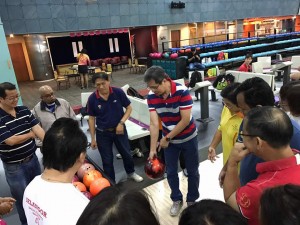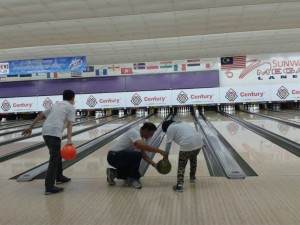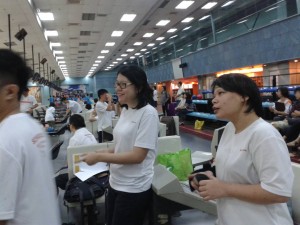IN May 2017, a friend encouraged me to get Nicholas into a bowling group consisting of young people with learning disabilities. There I noticed that the young bowlers were wearing T-shirts with “Special Olympics Selangor” (SOS) emblazoned on the back. I did not think much of it except to assume a connection with the Paralympics. Like many parents, I was more concerned with finding some form of organised activities for Nicholas so that he could have more opportunities for social interaction.
After a couple of weeks, I discovered that the Special Olympics and the Paralympics are two different entities. Maradona Chok, an electrical engineer turned bowling coach and currently holding the post of general manager of Malaysian Bowling & Coaches, explained it very well in a sentence: “The Paralympics is focused on sports performance by people with various disabilities while Special Olympics is focused on participation in sports by people with intellectual disabilities.”
The participants of the Special Olympics are called athletes. The Paralympics are held immediately after the Olympics while the Special Olympics World Games are held biannually alternating between the winter and summer games. Both are recognized by the International Olympics Committee. The next summer Special Olympics World Games will be held in Abu Dhabi in 2019.
An SOS bowling athlete, Tan Seng Kit (27 years old) has participated in various national, regional and World Games and won medals in the last 10 years of bowling. His mother, Jenny Tan recalled the moment she decided to follow through with bowling for her son. Seng Kit scored the highest points in a 1999 invitational bowling competition in Singapore and it was there that she saw her son’s determination to do his best. Today his tattered first prize of a bowling bag is still a prized possession.
The Special Olympics had its start as a camp for children with intellectual disabilities in 1962 at the home of its founder, Eunice Kennedy Shriver. She wanted children with intellectual disabilities to have the opportunities to play and participate in sports. In 1968, Shriver opened the first Special Olympics Games in Chicago, to a crowd of about 100 people in an 85,000 seat stadium. Some 1,000 athletes from the U.S. and Canada, classified as mentally retarded marched into the stadium and Shriver recited the Special Olympics Oath.
“Let me win,
but if I cannot win
let me be brave
in the attempt.”
Looking at the athletes in the bowling group, one cannot help but see the aptness of the oath. You can sense the determination and see the concentration on their faces. It is just them and the game. Each bowler would watch the ball going down the alley, just like any typical bowler. Then if they get a strike or hit the pins, they will jump with delight or high-five the coaches or one another. But if the ball dropped into the drain without hitting any of the pins, it was no big deal. They have done their best.
In fact, Chok said that it would be good if that sense of calm and being at their best in that moment could rub off a little bit onto the competitive bowlers. Chok started coaching the SOS group in November 2016 and said it made him look at life in a new way because here was a group of young people who are just so happy that they could bowl. “It is infectious”, he chuckled.
Another coach, Sherman Tan said he enjoys working with the SOS group and that they teach him patience. The coaches first teach the students how to swing the ball and how to stand or to get the correct posture. I observed the commitment and patience of the coaches in the way they got down on their knees to position legs or to support weak hands swinging the bowling balls.
Chief Coach David Foo and his team of coaches Kevin Lee, Sherman Tan and Joy Cheah can be seen correcting and talking to the athletes. There is a great sense of camaraderie among the coaches and their charges.
Recently, SOS held a Bowling Coach Training with priority given to parents and upon successful completion could lead to a Coaching Certificate. Many parents signed up and had a great time. One of the objectives of the Special Olympics is to get parents or caregivers to participate actively in the various sports to foster family bonding and appreciation of the athletes’ abilities.
Special Olympics have also introduced something they called “Unified Games” aimed at creating opportunities for building friendship and better understanding. In the Unified Games, people with and without intellectual disabilities team up and share sports training and competition experiences. And right here in Kuala Lumpur, the Special Olympics Selangor Unified Bowling will be held on 21 July 2017, from 10am-3pm at IOI City Mall Putrajaya. There will be 38 teams with each team made up of 3 athletes with Intellectual Disabilities (ID) and a partner with No Intellectual Disabilities (NID). Total number of participants stand at 152 people.
Since the first Special Olympics back in 1968, the Special Olympics have grown to include 180 countries with more than 3 million athletes training everyday across the globe.
Twenty-four year old Beverly Chin loves bowling and the opportunity to meet up with her fellow bowlers. When asked why bowling, she said with clear simplicity, “It is the one thing I am good at.” Her friend, Foo Zen Lee nodded her head in agreement and said, “I like this because I can bowl well.” And every Thursday night, Nicholas will say, “Tomorrow go bowling.”
SOS athletes meet up every Friday for a few hours of bowling and socialising. This Friday, June 23, is a special day, as it marks the 16th Anniversary of Special Olympics Selangor.
Special Olympics Selangor President, Patricia Wong is also working at getting the Athlete Leadership Programmes (ALPs) off the ground. While the Special Olympics have helped people with intellectual disabilities achieve joy, acceptance and success, the organisation also sees the importance of these athletes being empowered to become leaders and mentors for other athletes. They can train to become coaches and officials or learn to engage in policy discussion with the community and government leaders. They are their best advocates.
According to Wong, the organisation needs sponsors, sports partners and volunteers but the most urgent need of the moment is a projector to kickstart the Athlete Leadership Programme for SOS. For more details, email sosorpatricia1618@gmail.com.
“Special Olympics is not just about people with intellectual disabilities; it’s about unleashing the spirit to uncover the best in ourselves.” Tim Shriver.




